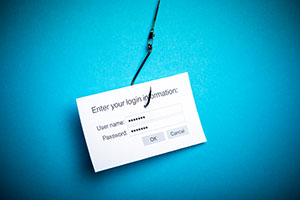You’ve probably opened your email before to see  something that looks like it’s from a familiar source—your bank, social media, a creditor—but something about it isn’t quite right. You see an attachment asking for sensitive personal or financial information, or a link asking you to fill in such information. What should you do?
something that looks like it’s from a familiar source—your bank, social media, a creditor—but something about it isn’t quite right. You see an attachment asking for sensitive personal or financial information, or a link asking you to fill in such information. What should you do?
The general rule is: don’t open anything from emails you’re not completely sure of. Phishing scams are extremely common, but if you remain alert, you can stop an attack before it happens. Be suspicious of emails you receive requesting sensitive information. Legitimate sources rarely use email to get important information from you. Even if they did, it usually is easy to confirm the legitimacy of the message. Here are some things you can consider as a phishing test when you receive a questionable email:
- Are you being asked to click a link for more information? Rather than clicking an emailed link, go directly to the website the email was supposedly sent from, or call them to find out if the message is real.
- Is it a threatening email? Does it claim that you, your credit or someone you know is in danger? If an email claims you must “Act Now!” to avoid a negative consequence, be suspicious. Contact the company that supposedly sent the message to confirm your suspicions.
- Does the email claim to have embarrassing or compromising photos or information about you or a loved one? This is an immediate red flag.
- Does the message offer something that sounds too good to be true—like, you’ve inherited a large sum of money from someone you’ve never heard of or met? You know the saying: If it sounds too good to be true, it probably is.
- Does the email look odd? Is the logo slightly different or does the email contain errors in grammar, spelling or formatting? These are indications of a fraudulent message.
- Does the email provide little information, but ask you to open an attachment to learn more? Don’t do it. Go straight to the supposed source of the email to check on the message.
Often, after following up on a questionable email, you’ll find no indication of the message being sent, meaning you just received a phishing scam email. Use the email phishing test above and listen to your gut; don’t open any attachments or click any links until you’re positive it’s safe.
While anyone can fall victim to phishing scams, using these phishing test tools can help you stay alert and guard against most phishing emails. You’re the first line of defense when it comes to defending yourself against phishing and cybercrime. Happily, you’re not alone when it comes to protection. Mission Fed works hard to help protect our members’ personal information. We never ask you to provide personal or financial information via email and we use security technology to keep your funds and information safe. Security is essential to success and at Mission Fed, your success is our bottom line.



